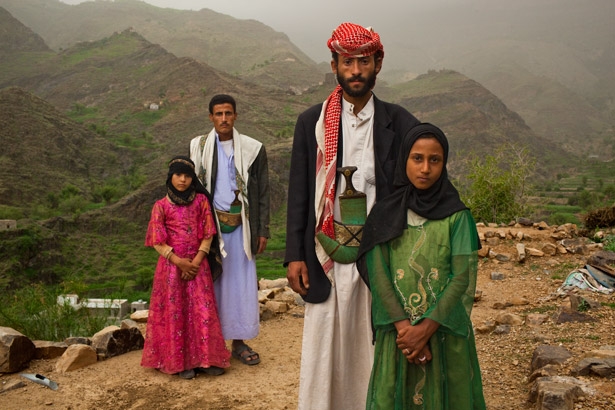Child Brides Are Children, Not Brides

Elizabeth Nyanyot Diu was forced into marriage in Sudan when she was 12 years old. Her husband was a 30-year-old man who beat and raped her regularly. She got pregnant soon afterwards. As she recalled in an Al Jazeera article, pregnancy "nearly killed me. My first born died because I was too young”. She experienced constant sexual assaults and physical humiliation which resulted in serious health complications.
Unfortunately, Elizabeth’s case is not uncommon. Forced child marriage is widespread in many poor and developing countries. On a global scale, every year 15 million girls get married before the age of 18. That’s 15 million minors, most of them unprepared for marriage physically and psychologically, who see their childhoods, health, education, and personal development destroyed on the altar of an early marriage.
These child brides, ranging from the age eight to 17, become totally disempowered, deprived of basic human rights and rendered completely dependent on their husbands. Most of them are forced into this status by parents who organize “arranged” marriages for them when they are only seven or eight years old.
According to an ICRV article, arranged marriage means that “one day, a child may be at home playing with her siblings and the next day she’s married off and sent to live in another village with her husband and his family – strangers”. Robbing a child of her childhood causes a lifelong trauma that is usually followed by other problems such as domestic violence and sexual abuse.
In many developing countries, despite laws against it, child marriage remains a common practice. In those countries poor people do not have access to education and health care. Both of these factors affect the early marriage rate because females in rural communities do not have any other function but reproduction. They are born to create families, to become mothers and grandmothers, and to continue the lineage.
The practice of forced marriage is particularly widespread in Pakistan, where it occurs in all regions of the country. Child marriage is linked to local customs and traditional practices. Usually parents force a Pakistani girl to get married at an early age in order to prevent her sexual transgression which is seen as the most damaging factor for a family’s reputation. Dishonoring of a family can have devastating consequences, including honor killing – the practice of killing a family member because she blemished her family’s reputation. Vitims of honor killings are often children who refuse to get married, or who leave their husbands and return to their parents’ communities.
Religion also plays a major role in child marriage. As Kuala Lumpur’s minister of legal affairs points out in this article, "Islam allows [marriage] as long as the girl is considered to have reached her pubescent stage, once she has her menstruation". This statement implies that it is permissible for a 12-year-old girl to get married just because she is menstruating.
Marriage of a 12-year-old child might be acceptable in some societies, but according to modern standards it not only a violation of basic human rights, it's illegal. This is exactly the problem that many European countries face in the current era of mass migration, when large numbers of child brides enter Europe and ask for asylum. According to an article by Breitbart News Network, dozens of Muslim emigrant child brides, the youngest being only 11 years old, have entered Norway recently. Among them is a 14-year-old pregnant girl who already had an 18-month-old baby. The pregnant girl’s 23-year-old husband is currently separated from her and their marriage case is under the police investigation.
The current dilemma is how to integrate these child brides and their husbands —who are actually criminals according to European law — into modern society? Since Norwegian law punishes any sexual relation with children, should all husbands of these child brides be sentenced and arrested? From one perspective, some might argue that, since they are on European territory, men with wives under 18 should be prosecuted according to the European law. However, from another perspective separation from their husbands might be even more traumatizing for child brides alone in an unknown country. This issue, triggered by the huge social and cultural differences between the West and the less developed countries, remains unresolved.
Still, the biggest dilemma is not how to punish the men who marry children, but how to prevent the child marriage from happening in the first place. In other words, governments should protect these children from being robbed of their childhood by forced marriages.
How can this be done?
Firstly, it is crucial to educate families. Giving girls access to education will improve their chances of gaining employment, personal development, self-achievement, and empowerment. Through education they will have more life prospects rather than only marriage and reproduction. Education of parents is also needed. Some traditional parents believe a child marriage has a protective purpose because the child’s husband will support her economically. These types of parents need to be informed about the harmful consequences of early marriage and the traumas it inflicts on children.
Secondly, societies should advocate for gender equality in all communities. This step is fundamental for in patriarchal communities females are not considered equal to men. People should promote female community leadership in order to give voices to these young females who are objects of physical and psychological violence.
Thirdly, the anti-child marriage organizations and campaigns should be promoted worldwide so awareness about child marriage is raised. Such organizations as Tostan, Girls Not Brides, and others should be supported not only by regular citizens but also by people in positions of influence — journalists, celebrities, and politicians — in order to raise awareness about this painful issue.
Child marriage is one of the biggest problems of our time and fighting against it will be a long process, requiring work at many sectors and at many levels. However, through global-scale collaboration we can make a change!











